- Home
- How to
- How to
- Services
- Services
- Maintenance Plan
- Location
- Guides
- Guides
- No Hot Water – Self help
- Unvented Water Heater
- Unvented Water Heater Faults
- G3 Building Regulations
- Thermal Store Water Heaters
- Thermal Store Faults
- Gledhill ElectraMate
- Gledhill PulsaCoil
- Gledhill Torrent
- Gledhill Stainless Lite
- OSO Unvented Heater
- MegaFlo – Heatrae Sadia
- Santon Premier Plus
- Albion
- Manco Riverstream and Powerstream
- Manco Gladiator & Stirling
- Telford Tempest
- Safety Considerations Unvented Cylinders
- Reduce Your Water Heating Bill
- Range Tribune
- About Us
- About us
- Forums
- Contact

Unvented Water Cylinder Engineers
G3 Qualified
-
Call Now
0161 941 5571
Thermal Store Water Heaters
Thermal Store Water Heaters
While unvented hot water heaters are quite common, thermal store water heaters are also widely used in homes and apartments throughout the UK. These systems work very differently from unvented systems, and actually get around some of the more pertinent disadvantages of unvented water heaters.
Thermal store water heaters are capable of providing the high flow rates of mains water pressure without the need for a reduction valve. They’re actually surprisingly simple in terms of basic operation – water within the cylinder is heated, and is then heat is disbursed through the home’s pipes by a heat exchanger without the heated water in the system ever actually coming into contact with the mains water. At EasyFlow, we can offer thermal store water heater repair services for customers in Manchester, Liverpool and the surrounding areas.
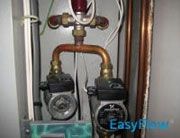
Electramate Pumps
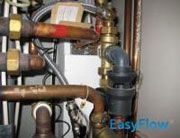
Electramate Discharge
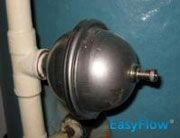
Mini Expansion Vessel
How Do Thermal Water Heaters Work?
Unlike vented systems, thermal store water heaters are fully vented into the atmosphere. They are also not pressurised. There are two separate water reservoirs here – a main cylinder, and a separate cold water chamber. The second chamber is both an expansion tank and a feed for the main tank.
Within the main tank, you’ll find an electric immersion heater element. These may be on an economy tariff, or they may not be. Note that thermal stores can be used with other sources of heat, and are particularly well suited for working with renewable energy sources, such as solar heating or heat pumps.
In an unvented hot water heater, the heated water is actually channelled through the home and disbursed through the pipes to the taps. However, thermal store water heaters do not distribute water through a home. Instead, the water actually stays within the cylinder at all times. They actually work in the reverse fashion of standard domestic hot water heaters.
Thermal store water heaters first warm and then store water in the cylinder. This heated water is then passed across a heat exchanger between the hot water heater and the main water lines, allowing heat from the water in the cylinder to warm the main lines, before the water is warmed once more, creating a constant cycle of hot water to maintain the optimum temperature within the water lines.
There are several reasons this is beneficial. First, it ensures that the quality of water in the main line remains as high as possible, removing the possibility of rust or corrosion from old water tanks contaminating a home’s water. Second, it conserves water and energy. Because the water within a thermal store water heater is never depleted, it can be more easily maintained at the optimum temperature without significant expenditures of energy.
There are a couple of different forms that heat exchangers can take with thermal store hot water heaters. One of those is a coil. In this system, mains pressure water passes through a coil of metal inside the hot water heater’s cylinder. The coil is wound a number of times to create a very large surface area.
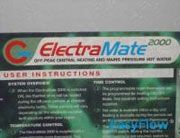
Gledhill ElectraMate
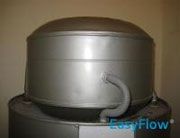
Gledhill PulsaCoil III Reservoir
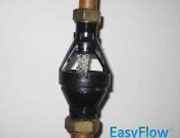
Temperature and Pressure
Some of the heat from the store (maintained at 75 degrees centigrade) is transferred to the water in the coil. In normal operation, the temperature of the water leaving the cylinder is far too high to be sent straight to the taps. Instead, it is mixed with cold water in a blending valve so that the temperature drops below 55 degrees. As a result, the water heater is able to deliver more usable water at 55 degrees than the cylinder actually holds, which offers significant space savings over conventional hot water heater designs.
Both designs reuse the same water over and over again, but the way they do this is different. In a system utilising a coil within the cylinder, the water is static, the only movement coming from expansion. In a plate heat exchanger setup, the water is pumped out the top of the unit and then back in at the bottom. To prevent mixing hot and cold water, a series of baffles is used.
Another deign is to incorporate a plate heat exchanger. In this type of system, the principle is similar to that outlined above, but the water flowing through the exchanger is regulated by a flow switch, a pump and often, a heat sensor.
In both of these designs, water pressure at the taps is dependent on the flow and pressure of the supply lines. So, if the water pressure at the inlet is low, then it will be low at the taps.
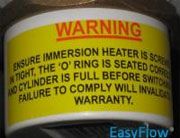
Immersion Heater Warning
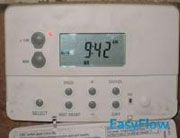
Secondary Return Timer
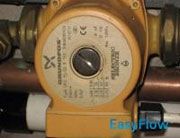
Thermal Store Circulator Pump
What Benefits Do Thermal Store Water Heaters Offer?
In comparison with unvented hot water heaters, thermal store water heaters can offer a number of crucial advantages. These include the following:
- Mains pressure hot water to all taps.
- More hot water delivered than the capacity of the cylinder, saving space in the cupboard.
- Water delivered at a safe temperature due to the use of a blending valve.
- No specialist installation requirements involved.
- Building control does not need to be notified of the installation.
- There are no tanks required, further reducing installation space requirements.
- Feature a vented cylinder, which means no danger of over pressurisation or expensive pressure valves.
- Do not require any annual service.
- Can be used in conjunction with renewable energy systems.
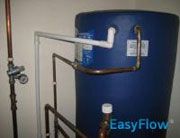
Gledhill Torrent Control Valves
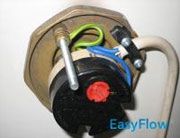
Immersion Heater Connections
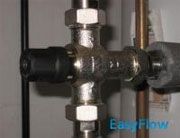
Thermal Store Blending Valve
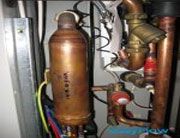
Electramate Flow Boiler
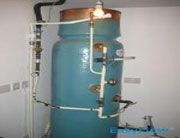
Manco Powerstream Litre
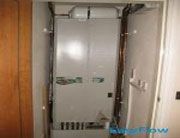
Gledhill ElectraMate Thermal Store
EasyFlow will guarantee the work we undertake for you, but not manufacturer parts. Most manufacturers offer a 12-month warranty on parts, and we pass that on to you. Note that some manufacturers do not offer a warranty on new parts fitted to an old water heater.
EasyFlow is a Country and Town Limited Service and we provide thermal store water cylinder repair and service for customers in Manchester, Liverpool and the surrounding areas.
If you need assistance with any hot water heater repairs, to schedule hot water heater maintenance, or to install a new hot water heater, call EasyFlow at 0800 433 4043
Call an EasyFlow Engineer Today
Find out more about EasyFlow Maintenance Plan
Joanne, Warrington
8 January 2024
Annual Service
Richard, Bolton
14 December 2023
Annual Service
Brian, Wilmslow
15 December 2023
Annual Service
Waheed, Hertfordshire
1 January 1970
No Hot Water
Excellent service as usual.Despite the terrible weather and the lift being out of order
JUDITH, Glossop
28 December 2023
Annual Service
Peter, Liverpool
30 November 2023
Annual Service
Jonathan, Liverpool
22 November 2023
Replacement Valves
Dominic, Chorlton
6 November 2023
Heating Control Replacement
An excellent service as usual and Chris was very helpful and informative.
Derek, Chester
2 October 2023
Annual Service

© 2025 Country & Town Limited. All rights reserved EasyFlow is a Country & Town Limited service







Find out what our clients are saying about the services we provide
Click to view